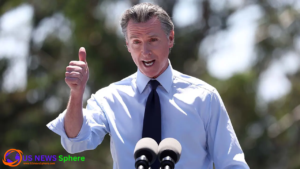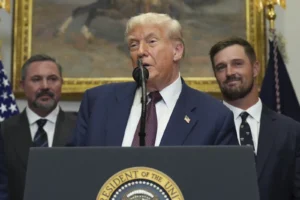Trump’s Bold Move: Executive Order Targets Voice of America Amidst Free Speech Debates
President Donald Trump’s executive order targeting Voice of America (VOA) and its parent organization, the U.S. Agency for Global Media (USAGM), has sparked widespread debate about press freedom and government influence on publicly funded media. The order, signed on March 15, 2025, significantly reduces VOA operations, putting employees on administrative leave and cutting funding to other U.S.-backed news organizations such as Radio Free Europe/Radio Liberty and Radio Free Asia.
This decision has triggered both praise and criticism, raising important questions about free speech, government spending, and media independence. Let’s break down the key components of this issue.
Why Trump’s Order Matters
What is Voice of America (VOA)?
- Founded in 1942 during World War II to combat propaganda.
- Reaches 350 million people weekly in nearly 50 languages.
- Provides unbiased news in regions where media is controlled by authoritarian regimes.
How the Executive Order Affects VOA
| Before the Order | After the Order |
|---|---|
| Funded by U.S. taxpayers | Government funding cut drastically |
| 3,500+ employees worldwide | Thousands placed on administrative leave |
| Broadcasts in restricted media regions | Many operations completely shut down |
Arguments For and Against the Order
| Supporters Say | Critics Say |
| Reduces government spending | Undermines U.S. global influence on press freedom |
| Prevents taxpayer-funded media bias | Weakens journalism in countries with limited free press |
| Government should not fund media | Risks empowering authoritarian propaganda |
The Implications for Global Media
The executive order comes at a time when misinformation and media suppression are growing concerns worldwide. By defunding organizations that provide reliable news, experts worry that the U.S. is retreating from its long-standing role as a champion of press freedom.
Real-World Impact of VOA’s Shutdown
- China, Russia, and Iran: These countries have historically cracked down on independent journalism. VOA provided crucial reports on government actions and human rights violations.
- Emerging Democracies: Many developing nations relied on VOA for non-partisan, factual reporting, helping counter disinformation.
- Misinformation Surge: Without VOA’s counter-narratives, propaganda networks could become more dominant.
Industry Reactions and the Future of U.S. Media Policy
Government’s Justification for the Cuts
The Trump administration argues that these moves:
- Are part of a broader initiative to reduce federal intervention in media.
- Help eliminate potential government bias in journalism.
- Ensure that taxpayer dollars are not funding political narratives.
Opposition from Press Freedom Groups
- The Committee to Protect Journalists warns that over 70% of VOA’s employees may lose their jobs.
- The Reporters Without Borders organization has condemned the move as a major threat to independent journalism.
- International watchdogs fear that authoritarian governments may use this as an excuse to tighten media control in their own countries.
Conclusion: A New Era for Government-Funded Journalism?
The executive order targeting Voice of America represents a turning point in how the U.S. government interacts with publicly funded journalism. While supporters argue that the cuts reduce waste and address bias, critics see them as an attack on press freedom and global democracy promotion.
Key Takeaways:
- VOA’s Shutdown: The first major disruption in its 80+ years of operation.
- Government’s Argument: Reducing media bias and unnecessary federal spending.
- Critics’ Concern: Weakens independent journalism and democratic values.
- Future Impact: Uncertain, with potential consequences for U.S. global influence.
The coming months will determine whether these measures remain in place or if Congress and advocacy groups push back against the order. Will private media outlets step in to fill the void left by VOA, or will misinformation thrive in its absence? As this debate unfolds, one thing is clear: the role of independent journalism in the U.S. and worldwide is more critical than ever.
Read more about how international watchdogs are responding to this decision.





